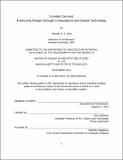Trinidad Carnival : improving design through computation and digital technology
Author(s)
Noel, Vernelle A. A. (Vernelle Aletia)
DownloadFull printable version (22.08Mb)
Alternative title
Improving design through computation and digital technology
Other Contributors
Massachusetts Institute of Technology. Department of Architecture.
Advisor
Azra Aksamija.
Terms of use
Metadata
Show full item recordAbstract
This thesis explores the integration of computation and digital technology to support design in the Trinidad Carnival. I argue that computation can contribute to design in the Trinidad Carnival by (1) addressing the dying art of wire bending, (2) improving design, and (3) by fostering a more inclusive design process. My study is motivated by the current design problems in the Trinidad Carnival. They include the dying art form of wire bending, the lack of time and resources to generate design alternatives, the lack of an inclusive design process, and the lack of community involvement in "making" in Carnival. To address these problems, I develop support based on a comprehensive study of the existing situation, and explore the integration of computational tools and digital technology in the design process. To that end, I (1) develop the Bailey-Derek wire bending grammar to capture the unique, traditional art form of wire bending, (2) propose a new, more inclusive design process, (3) use computation and digital technology to enable the generation of design alternatives and create "objects to think with" in the design process, and (4) add to the understanding of a design process outside the domains of product, industrial, architecture, and engineering design. These explorations are significant because: 1. The wire bending shape grammar can be used as an educational tool to address the current absence of a system to pass on this dying art form; 2. A digital tool can be developed from the encoding of the visual design features in wire bending further supporting this art form; and 3. The integration of computation and digital technology in the design process can improve design by creating a more inclusive design process, allow the generation of design alternatives, and creating "objects to think with" in design. The Carnival of Trinidad has spawned more than 70 carnivals around the globe. It is the most copied, but yet most understudied carnival in the world. This thesis fills a gap in current literature by taking a computational and design perspective to this phenomenon.
Description
Thesis (S.M. in Architecture Studies)--Massachusetts Institute of Technology, Dept. of Architecture, 2013. This electronic version was submitted by the student author. The certified thesis is available in the Institute Archives and Special Collections. Cataloged from student-submitted PDF version of thesis. Includes bibliographical references (pages 175-178).
Date issued
2013Department
Massachusetts Institute of Technology. Department of ArchitecturePublisher
Massachusetts Institute of Technology
Keywords
Architecture.